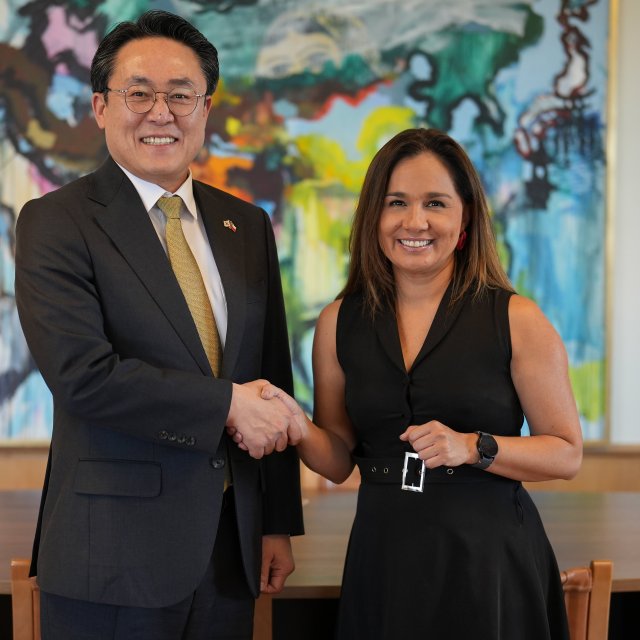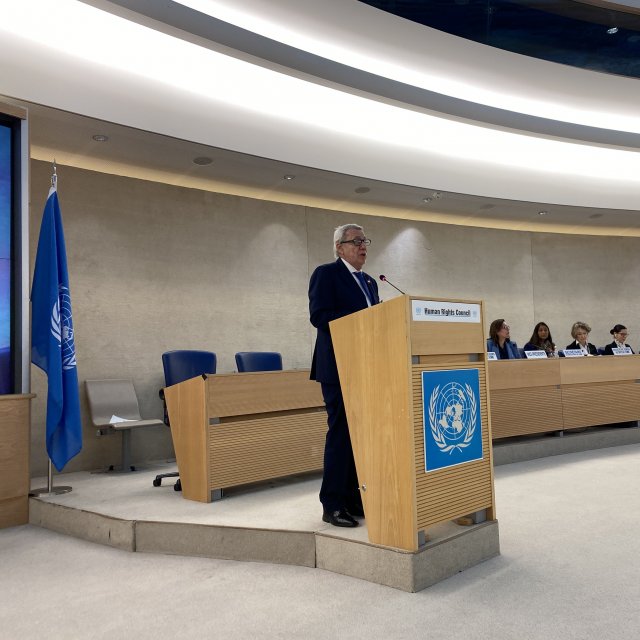 Thursday, February 27th 2025
Undersecretary meets with the Minister of Oceans and Fisheries of the Republic of Korea
Thursday, February 27th 2025
Undersecretary meets with the Minister of Oceans and Fisheries of the Republic of Korea
Minister Antonia Urrejola highlights Chile's commitment to the promotion and protection of human rights at the 52nd session of the Human Rights Council

The Minister of Foreign Affairs, Antonia Urrejola, spoke today at the High Level Segment of the 52nd Session of the Human Rights Council at the Palais des Nations in Geneva, Switzerland. This is the fourth time that Chile holds a seat as a member of this UN body, after obtaining the first regional majority in the elections of October last year.
She stressed that for Chile this is the main space for cooperation, dialogue and consensus on human rights in the United Nations. "We defend the need for a multilateral order that recognises the profound interrelationship between the dimensions of peace and security, democracy and participation, sustainable development and inclusion, and human rights as the central axis of our country's international action," she said.
The Foreign Affairs Minister pointed out that Chile's commitment to the promotion and protection of human rights also stems from the lessons of the country's own history. In this regard, she pointed out that 2023 marks the 50th anniversary of the coup d'état that overthrew the government of President Salvador Allende and installed a dictatorial regime.
In this regard, she recalled that, during the dictatorship, "international cooperation and the accompaniment of international organisations were essential to assist nationals in situations of need, as well as to press for the restoration of democracy. During the transition, this support was very important to strengthen our democratic and human rights institutions, which at that time were still very fragile".
The Minister added that the government is also adopting measures to address the many current challenges arising from recent situations of social conflict in our country. "Proof of this is the establishment of the Bureau of Integral Reparation for victims of human rights violations during the social upheaval, which is currently in operation," she said.
Priorities in the Council
In her speech, the Minister also referred to Chile's priorities during its Council period, which will run until 2025. In this regard, she assured that the Government has set out to promote a Feminist Foreign Policy, which will ensure "the integration of the gender perspective and the protection of the rights of women and girls in all their diversity, especially with regard to the eradication of gender violence in all its dimensions".
At the same time, she indicated that "the defence and promotion of the human rights of LGBTIQ+ people is also an objective of our foreign policy that we will seek to reflect in our work in this forum".
The Foreign Affairs Minister also stated that Chile has launched a Turquoise Foreign Policy, "which integrates actions to respond to the triple crisis of climate, biodiversity loss and global pollution, with a focus on just transition and sustainable and inclusive development". In this regard, he stressed that one of the first measures adopted by the government was to adhere to the Escazú Agreement, which, among other things, provides special protection for environmental defenders".
Artículos relacionados
 Thursday, February 27th 2025
Undersecretary meets with the Minister of Oceans and Fisheries of the Republic of Korea
Thursday, February 27th 2025
Undersecretary meets with the Minister of Oceans and Fisheries of the Republic of Korea
 Monday, February 24th 2025
Minister van Klaveren reaffirms Chile's commitment to human rights and gender equality
Monday, February 24th 2025
Minister van Klaveren reaffirms Chile's commitment to human rights and gender equality









